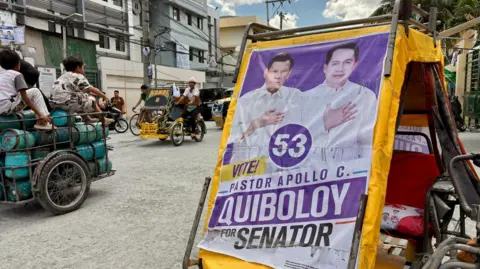A Closer Look at the Latest Election in the Philippines: Key Outcomes and Power Shifts
The latest election in the Philippines has drawn global attention with its dramatic power shifts and dynastic rivalries. This cycle, characterized by an intense contest between the Duterte and Marcos families, has reshaped the country’s political landscape and spurred discussions about governance, accountability, and the future of Filipino democracy.
A Dramatic Showdown: Duterte vs. Marcos
This latest election saw 18,000 seats at stake, spanning from local councilors to the influential Senate. The spotlight, however, focused on Rodrigo Duterte’s unexpected rise. Even from his prison cell at The Hague, Duterte succeeded in securing the mayoral seat for his political stronghold in Davao City. Despite his ongoing trial at the International Criminal Court, Duterte's enduring popularity, especially in southern Mindanao, proved decisive. His family’s dominance was further cemented as several of his children and grandchildren also won key local offices.
The Marcos-Duterte feud added an extra layer of unpredictability to the latest election. Vice-President Sara Duterte, embroiled in impeachment proceedings, remained a central figure as supporters and detractors eyed the implications for the 2028 presidential race.
Unpredictable Results and Voter Sentiment
One defining feature of this latest election was the unpredictability of the results. Opinion polls failed to accurately predict several major races. Candidates closely tied to President Ferdinand "Bongbong" Marcos Jr. did not perform as strongly as expected, allowing Duterte allies and independents to capture significant seats in the Senate and beyond. This underlines a shifting voter sentiment, one that prioritizes strong local leadership and established names, even amid ongoing controversies.
Reports indicated high voter turnout with long queues at polling stations. The atmosphere reflected both the deep-rooted political fervor and the influence of personality-driven campaigns. However, sporadic incidents, such as voting machine malfunctions and isolated violence, highlighted ongoing challenges in the Philippine electoral process.

Impact of Duterte’s Detainment on the Election Outcome
Rodrigo Duterte’s arrest earlier this year might have served as a setback for some politicians. However, it appears to have bolstered his loyal base instead. Commentators like Cleve Arguelles have noted that the former president’s legal woes only strengthened support among his followers, further fueling their determination to keep the Duterte dynasty at the helm. For further details on Duterte’s legal situation and electoral campaign, you can read how he managed to win from a prison cell.
Looking Ahead: What the Results Mean for the Philippines
The results from the latest election are expected to shape the country’s political agenda leading up to 2028. With Sara Duterte facing possible impeachment and the Marcos family’s influence tested, the coming years promise continued political maneuvering. One key takeaway is the resilience of local dynasties and the enduring influence of charismatic leaders in Philippine politics.
To gain more insight into the aftermath and comprehensive voting patterns, more updates can be found in this New York Times analysis.
Conclusion: The Path Forward After the Latest Election
The Philippines’ latest election underscored both continuity and change. Power bases remain strong, but political alliances are fragile. As the country moves forward, citizens and global observers alike will be watching how the leaders address corruption, economic challenges, and justice. In the ever-evolving world of Philippine politics, the only constant is change. Stay tuned for further updates as the political landscape continues to shift.